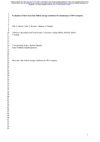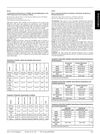 February 2024 in “Journal of ayurveda and integrated medical sciences”
February 2024 in “Journal of ayurveda and integrated medical sciences” Ayurvedic treatment and Yoga Basti therapy improved a woman's PCOS symptoms.
 January 2024 in “Journal of the Endocrine Society”
January 2024 in “Journal of the Endocrine Society” The research found that measuring androgens in urine can give extra information about body metabolism and is linked to androgen levels in the blood, especially in young girls.
 December 2023 in “JCEM case reports”
December 2023 in “JCEM case reports” A new gene variant causes glucocorticoid resistance in a mother and son.
 December 2023 in “Frontiers in endocrinology”
December 2023 in “Frontiers in endocrinology” Excess androgens may cause PCOS, not just be a symptom.
 October 2023 in “bioRxiv (Cold Spring Harbor Laboratory)”
October 2023 in “bioRxiv (Cold Spring Harbor Laboratory)” Hair follicles can be kept in RNAlater® at cool or room temperature for a week without harming RNA quality.

Stress significantly contributes to hair loss, especially in women and those aged 31-40.
 September 2023 in “Frontiers in cell and developmental biology”
September 2023 in “Frontiers in cell and developmental biology” Vav2 changes how hair follicle stem cells' genes work as they age, which might improve regeneration but also raise cancer risk.
 June 2023 in “Medeniyet medical journal”
June 2023 in “Medeniyet medical journal” People with alopecia areata have similar retinal structures but thicker choroidal regions compared to those without the condition.

Lifestyle changes can improve skin health and reduce disease symptoms.
 November 2022 in “CARDIOMETRY”
November 2022 in “CARDIOMETRY” A group has developed therapies that show promise for treating cancer and various other conditions.
 November 2022 in “Research Square (Research Square)”
November 2022 in “Research Square (Research Square)” The research provides insights into hair follicle growth in forest musk deer by identifying key genes and pathways involved.
 August 2022 in “Revista de la Universidad Industrial de Santander/Salud UIS”
August 2022 in “Revista de la Universidad Industrial de Santander/Salud UIS” Stress-related hair loss was reversed with a special medication.
 June 2022 in “International journal of research and review”
June 2022 in “International journal of research and review” The article concludes that early diagnosis and lifestyle changes can prevent complications from high uric acid levels.
 May 2022 in “Indian Journal of Animal Research”
May 2022 in “Indian Journal of Animal Research” Melatonin receptor genes likely play an important role in the development of goose feather follicles.

Researchers found a genetic link for hereditary hair loss but need more analysis to identify the exact gene.

Wild African goats have genetic adaptations for surviving harsh desert conditions.
 January 2021 in “bioRxiv (Cold Spring Harbor Laboratory)”
January 2021 in “bioRxiv (Cold Spring Harbor Laboratory)” Mothers have more hair proteins than their children, with age-related differences in protein patterns, and some proteins in hair could indicate early childhood development.
 December 2020 in “bioRxiv (Cold Spring Harbor Laboratory)”
December 2020 in “bioRxiv (Cold Spring Harbor Laboratory)” Stress can cause a type of hair loss in mice lacking the CCHCR1 gene.
 January 2020 in “Journal of Pharmacognosy and Phytochemistry”
January 2020 in “Journal of Pharmacognosy and Phytochemistry” The VCO-based herbal hair tonic is effective, safe for hair loss treatment, and can be mass-produced.
 April 2018 in “bioRxiv (Cold Spring Harbor Laboratory)”
April 2018 in “bioRxiv (Cold Spring Harbor Laboratory)” Certain small molecules can help regrow hair by turning on the body's cell cleanup process.

Hormones, especially testosterone and DHT, are key for penis development and function, and testosterone therapy may help with erectile dysfunction in those with low levels.
 July 2017 in “Contemporary Endocrinology”
July 2017 in “Contemporary Endocrinology” The document concludes that patient outcomes for Congenital Adrenal Hyperplasia are often not ideal because of poor management and a need for better diagnosis and treatment methods.
 January 2017 in “Jikken doubutsu ihou/Jikken doubutsu/Experimental animals/Jikken Dobutsu”
January 2017 in “Jikken doubutsu ihou/Jikken doubutsu/Experimental animals/Jikken Dobutsu” Mice with a changed Hr gene lose and regrow hair due to changes in the gene's activity.
 January 2017 in “Elsevier eBooks”
January 2017 in “Elsevier eBooks” Stress and hormones like progesterone can affect absence seizures, but their effects change with different life stages.
 January 2015 in “Elsevier eBooks”
January 2015 in “Elsevier eBooks” Nanocarriers like liposomes and cyclodextrins improve how angiotensin-(1-7) is delivered in the body.
 September 2014 in “Aktuelle Dermatologie”
September 2014 in “Aktuelle Dermatologie” The symposium concluded that environmental factors significantly contribute to skin aging.
 May 2014 in “Journal of Investigative Dermatology”
May 2014 in “Journal of Investigative Dermatology” Scientists developed tools to observe hair regeneration in real time and assess skin health, using glowing mice and light-controlled genes.
 April 2014 in “Medical Clinics of North America”
April 2014 in “Medical Clinics of North America” Accurate diagnosis and tailored treatment are crucial for managing common primary care symptoms.
 October 2013 in “Journal of the American College of Cardiology”
October 2013 in “Journal of the American College of Cardiology” Autonomic dysfunction is common in hypertensives but may not cause diastolic dysfunction in resistant hypertension.
 December 2011 in “Drug Research”
December 2011 in “Drug Research” The document shows the state of pharmaceutical patents as of 1999, focusing on treatments for various diseases.






























